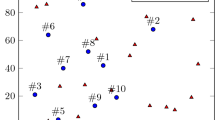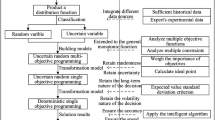Abstract
Multilevel programming is developed for modeling decentralized decision-making processes. For different management requirements and risk tolerances of different-level decision-makers, the decision-making criteria applied in different levels cannot be always the same. In this paper, a hybrid multilevel programming model with uncertain random parameters based on expected value model (EVM) and dependent-chance programming (DCP), named as EVM–DCP hybrid multilevel programming, is proposed. The corresponding concepts of Nash equilibrium and Stackelberg–Nash equilibrium are given. For some special case, an equivalent crisp mathematical programming is proposed. An approach integrating uncertain random simulations, Nash equilibrium searching approach and genetic algorithm is designed. Finally, a numerical experiment of uncertain random supply chain pricing decision problem is given.
Similar content being viewed by others
References
Anderson, E. J., & Bao, Y. (2010). Price competition with integrated and decentralized supply chains. European Journal of Operational Research, 200(1), 227–234.
Arora, S. R., & Gupta, R. (2009). Interactive fuzzy goal programming approach for bilevel programming problem. European Journal of Operational Research, 194, 368–376.
Ben-Ayed, O., & Blair, C. E. (1990). Computational difficulties of bilevel linear programming. Operations Research, 38, 556–560.
Bhattacharyya, R., Chatterjee, A., & Kar, S. (2013). Uncertainty theory based multiple objective mean-entropy-skewness stock portfolio selection model with transaction costs. Journal of Uncertainty Analysis and Applications, 1, Article 16.
Bracken, J., & McGill, J. M. (1973). Mathematical programs with optimization problems in the constraints. Operations Research, 21, 37–44.
Bracken, J., & McGill, J. M. (1974). A method for solving mathematical programs with nonlinear problems in the constraints. Operations Research, 22, 1097–1101.
Ding, S. (2014). Uncertain random newsboy problem. Journal of Intelligent & Fuzzy Systems, 26(1), 483–490.
Gao, J., & Liu, B. (2005). Fuzzy multilevel programming with a hybrid intelligent algorithm. Computers & Mathematics with Applications, 49, 1539–1548.
Gao, J., Liu, B., & Gen, M. (2004). A hybrid intelligent algorithm for stochastic multilevel programming. IEEJ Transction on Electronics, Information and Systems, 124, 1991–1998.
Gao, Y. (2012). Uncertain models for single facility location problems on networks. Applied Mathematical Modelling, 36(6), 2592–2599.
Jana, D. K., Maity, K., & Roy, T. K. (2013). A three-layer supply chain integrated production-inventory model under permissible delay in payments in uncertain environments. Journal of Uncertainty Analysis and Applications, 1, Article 6.
Ke, H. (2014). A genetic algorithm-based optimizing approach for project time-cost trade-off with uncertain measure. Journal of Uncertainty Analysis and Applications, 2, Article 8.
Ke, H., Su, T., & Ni, Y. (2014). Uncertain random multilevel programming with application to production control problem. Soft Computing,. doi:10.1007/s00500-014-1361-2.
Lai, Y. J. (1996). Hierachical optimization: A satisfactory solution. Fuzzy Sets and Systems, 77, 321–335.
Lan, Y., Zhao, R., & Tang, W. (2011). A bilevel fuzzy principal-agent model for optimal nonlinear taxation problems. Fuzzy Optimization and Decision Making, 10(3), 211–232.
Lasdon, L. S. (1968). Duality and decomposition in mathematical programming. IEEE Transactions on Systems, Science and Cybernetics, 4(2), 86–100.
Lasdon, L. S. (1970). Optimizing theory for large system. New York: Macmillan.
Liou, Y., Wu, S., & Yao, J. (2005). Bilevel decision with generalized semi-infinite optimization for fuzzy mappings as lower level problems. Fuzzy Optimization and Decision Making, 4(1), 41–50.
Liu, B. (2007). Uncertainty theory (2nd ed.). Berlin: Springer.
Liu, B. (2009). Some research problems in uncertainty theory. Journal of Uncertain Systems, 3, 3–10.
Liu, B. (2010). Uncertainty theory: A branch of mathematics for modeling human uncertainty. berlin: Springer.
Liu, Y. H. (2013a). Uncertain random variables: A mixture of uncertainty and randomness. Soft Computing, 17(4), 625–634.
Liu, Y. H. (2013b). Uncertain random programming with applications. Fuzzy Optimization and Decision Making, 12(2), 153–169.
Lu, Y., Huang, Z., & Gao, J. (2014). Under-investment problem with adverse selection in uncertain environment. Journal of Uncertain Systems, 8(2), 83–89.
Ma, W., Wang, M., & Zhu, X. (2013). Hybrid particle swarm optimization and differential evolution algorithm for bi-level programming problem and its application to pricing and lot-sizing decisions. Journal of Intelligent Manufacturing,. doi:10.1007/s10845-013-0803-5.
Mohammadi, M., Ghomi, S. M. T. F., Karimi, B., & Torabi, S. A. (2010). Rolling-horizon and fix-and-relax heuristics for the multi-product multi-level capacitated lotsizing problem with sequence-dependent setups. Journal of Intelligent Manufacturing, 21(4), 501–510.
Patriksson, M., & Wynter, L. (1999). Stochastic mathematical programs with equilibrium constraints. Operations Research Letters, 25, 159–167.
Wang, G., Gao, Z., Xu, M., & Sun, H. (2014). Models and a relaxation algorithm for continuous network design problem with a tradable credit scheme and equity constraints. Computers & Operations Research, 41, 252–261.
Yang, X., & Gao, J. (2013). Uncertain differential games with application to capitalism. Journal of Uncertainty Analysis and Applications, 1, Article 17 .
Yang, X., & Gao, J. (2014). Uncertain core for coalitional game with uncertain payoffs. Journal of Uncertain Systems, 8(2), 13–21.
Zhang, G., & Lu, J. (2010). Fuzzy bilevel programming with multiple objectives and cooperative multiple followers. Journal of Global Optimization, 47, 403–419.
Acknowledgments
The work was partly supported by the National Natural Science Foundation of China (71371141, 71001080, 71103128), and the Fundamental Research Funds for the Central Universities.
Author information
Authors and Affiliations
Corresponding author
Rights and permissions
About this article
Cite this article
Ke, H., Ma, J. & Tian, G. Hybrid multilevel programming with uncertain random parameters. J Intell Manuf 28, 589–596 (2017). https://doi.org/10.1007/s10845-014-0985-5
Received:
Accepted:
Published:
Issue Date:
DOI: https://doi.org/10.1007/s10845-014-0985-5




